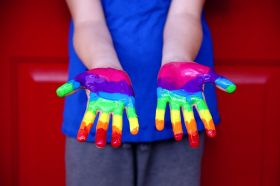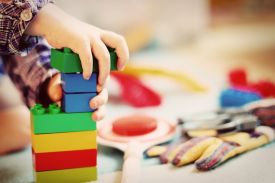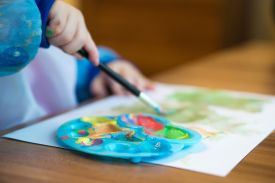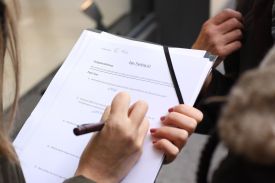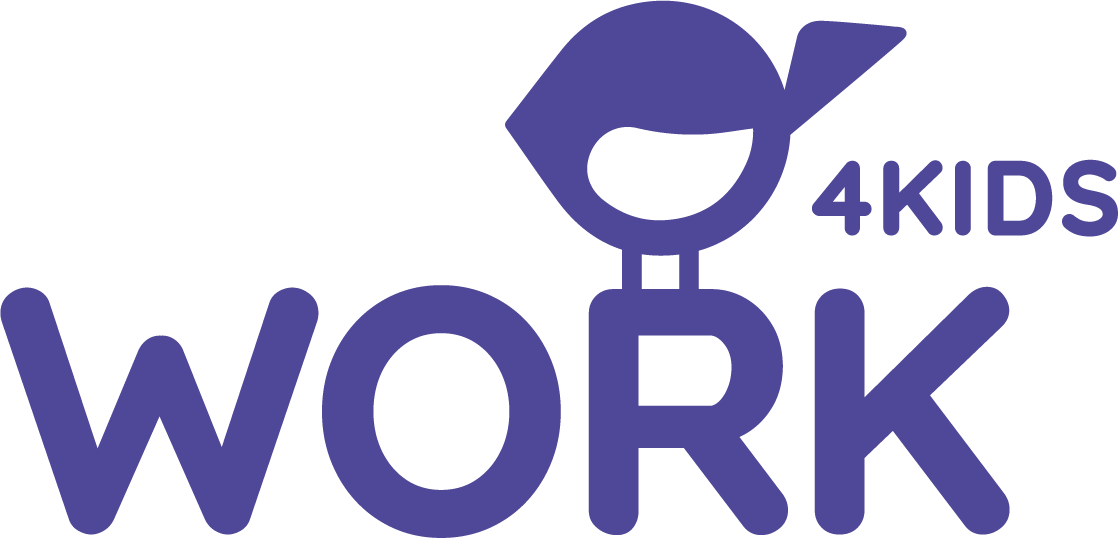Basics
Educational content of the facility
Our educational work is based on the Hessian Education and Upbringing Plan (BEP).
In accordance with the BEP, we work according to the situation-based approach. This means teaching project topics on the basis of holistic learning and preparing them according to the children's interests, needs and curiosity.
Learning content is conveyed in a playful and exciting way, the fun of learning is maintained and encouraged. When carrying out the projects, care is taken to cover all areas of education with topic-specific activities. Picking up on the children's interests is the most important prerequisite for successful learning processes. For this reason, it is essential for us to involve the children in these processes.
At the same time, responding spontaneously to the children's wishes and interests in situations that are important to them, so that a planned activity can be postponed for the time being, requires a high degree of flexibility and empathy from the specialist staff. This is why precise observation is one of the most important key pedagogical qualifications and the basis of our pedagogical activities.
In our daily interaction with the children, we focus on their individual needs. The children are seen as independent personalities. The basic prerequisite for this is accepting, respecting and encouraging and challenging each individual child in their individuality, development and daily form.
On the basis of a solid relationship of trust between child, parents and the professionals, characterized by safety and security in the rooms and groups of our facility and a warm, loving working atmosphere, qualified education and support of the children can then take place, to which we attach particular importance. For children of all ages, rituals and a regulated daily routine are particularly important so that they can move within their familiar framework. The morning circle and mealtimes are an integral part of the group's daily routine.
The starting point for this educational approach is real life situations that are meaningful for children. We support the children in experiencing more autonomy and competence in conflict and crisis situations. During free play in particular, children find new developmental stimuli and learning areas for their holistic development.
From this, the children should develop possible courses of action for themselves and design creative solutions that are geared towards experiencing the present as an essential part of their lives, in which it is worthwhile to act actively and shape it in a lively way.
These opportunities for action very often arise independently during free play, where we act as observers. Children should be able to recognize them and act independently, competently and appropriately to the situation. For this reason, free play is particularly important in our educational activities. For us, free play means that the children are given the opportunity to work independently and actively and to learn on their own.
As professionals, we see ourselves as observers and creators in this context. We take note of the actions, interests and learning processes of the respective children and prepare their environment accordingly in order to support them in their independent appropriation of the world. We see our pedagogical activities as holistic upbringing and education that is not limited to the facility.
Especially as an integrative facility, we want to offer children the opportunity to gain shared experiences, to interact with each other without prejudice and to learn to accept others with their strengths and weaknesses.
It is important for us to make it clear that integration does not simply take place ideally as soon as disabled or developmentally delayed and non-disabled children meet. Rather, we see integration as a process with different phases and different stages of development. Integration must grow and develop, and work must be done to ensure that this process of integration continues to develop and does not come to a standstill.
As a rule, children deal with the “otherness” of others surprisingly calmly, provided that the environment does not show any particular reactions. They are curious, wait-and-see, observant, find some things boring or particularly interesting. Depending on the developmental delay or disability, the children experience or recognize the limitations or impairments of the inclusive child more or less clearly. For example, a child may not yet be able to walk, speak properly or see properly. They know much of this from their own developmental history when they were younger. Children are often irritated when their previous explanations no longer fit; for example, when older children are not yet able to walk or eat on their own.
It is then important for caregivers to show the children explanatory models, e.g. why a child with impaired perception behaves in this way or how to communicate with a hearing-impaired child. It is equally important to make the children aware of their own impairments, e.g. the staff member who wears glasses or tells them what she herself is not good at.
We see integration as an opportunity to learn that everyone is different and unique, that everyone has weaknesses and strengths and that this is a good thing.
Our guiding principle is: “It is normal to be different”!
At our facility, we try to create the conditions
for children to grow up together without bias and gain experience in dealing with each other.
that children learn to deal with their own strengths and weaknesses and to accept these in others.
that children benefit from the concept of individual development support by learning and being supported according to their level of development.
that parents and relatives of the children establish contacts and thus reduce possible fear of contact.
°that the acceptance of others as they are, without forcing them into a norm, is encouraged.
°that the children get to know other ways of life and develop individual ways of interacting and playing as well as more tolerant behavior.
°that children learn to help each other and treat each other appropriately through social interaction and joint activities.
°that children are encouraged to interact honestly with each other without false consideration (laughing, crying, playing, arguing together...).
°that parents get to know how to deal with disabled and non-disabled children through joint discussions, experiences and parents' evenings.
From our point of view, integration is a process with ups and downs, constant movement and change. We, the children and their parents, also have to keep working on it, e.g. at parents' evenings, in the kindergarten group, in individual and group discussions.
The issue of hitting, biting and pushing is taken very seriously in our daycare center. Colleagues are professionally trained in dealing with this issue and parents receive regular information on the subject.
Educational goals and methods
Legal basis
“Every young person has a right to support their development and to be educated to become an independent and socially responsible person.” (Section 1 of the Child and Youth Welfare Act, KJHG)
Basic measures for achieving goals
We use the following basic measures in the integrative daycare center:
Emphatic perception and fulfillment of the child's needs
Establishing secure attachment behavior through familiar caregivers
Active and non-verbal communication with the child in all areas (including sign language, Metacom, supported communication and many more). )
Granting age-appropriate freedom of action while creating security and orientation through boundaries and rules
Age-specific educational and support projects in all areas of development
Teaching norms and values
Verbalizing and dealing with emotions at an early age
Targeted observation of the child's development through development documentation
Individual support for talents and developmental deficits
Child-friendly media initiation
Participation, co-determination, improvement and complaint management
The promotion of personality, independence and social behaviour are important focal points in our facility. The support should open up new scope and opportunities for the child, i.e. the support should be life-expanding and personality-enhancing. The children's independence plays an important role in this. The children should learn to take responsibility for certain manageable areas and also experience how important it is to support each other.
The children learn and practise co-determination and democracy at the regular “children's conference”, a forum in which the children's rules, projects, wishes and complaints are discussed and voted on together. At the children's conference, the children learn to express their own wishes or anger appropriately, to make this clear to others, to listen to others and to experience the consequences of their own decisions. The children should also learn that every child has the right to express their opinion and that this is also taken into account in everyday life. We try to involve the children in many important decisions within the daycare center and allow them to have a say.
For example, the children were asked how the outdoor area should be redesigned and where play corners should be set up in the group.
The children have an indirect say in how long their settling-in period lasts, as this depends on the needs of the individual child.
The children in the daycare groups also have a say in deciding which food is ordered in the kitchen, which topic is dealt with in the group's project work, which purchases are desired and which special activities (e.g. wheel day, pyjama party, picnic, anything-goes day, etc.) are to be considered for the period from one to the next children's conference outside of the weekly schedule. All suggestions made by the children are taken seriously, discussed together with the children and joint solutions are developed.
As with all adults in the daycare center, children also have the opportunity to use the improvement and complaints management system. The children can either do this with the help of their parents and teachers or address their ideas or complaints directly to the management in person. In accordance with the JG Rhein-Main improvement and complaints management process, the prescribed processing procedure is also followed here.
Once a year, the children's satisfaction is surveyed using a questionnaire, evaluated and the results adapted to everyday group life. This allows the children to experience important democratic principles, such as the right to freedom of expression, co-determination and equality. They should experience that rules are not simply made by adults, but that they are based on certain experiences and reasons. Children have the right to find out the reasons and to question them.
The children should also experience independence and autonomy when using the various rooms. Almost all rooms can be used independently by the children, subject to the transparent rules.
Children who are not yet able to use the rooms independently can use them with a member of staff.
Supporting the children in conflict resolution is particularly important to us. The children should not experience the staff as “conflict solvers” for their own problems or conflicts with others, but as helpers who support the child with ideas and ways to resolve this conflict independently and appropriately. In this way, children should learn to show and tell others clearly and appropriately what they want or don't want without having to constantly rely on the help of adults.
Since summer 2006, we have been offering the program “Faustlos - a curriculum to promote social-emotional skills and prevent violence” once a week for all children from the age of three as an ongoing project on this topic.
Children in the crèche take part in the “Fäustlinge” program once a week.
Religious education
As a Christian institution, we try to convey an appropriate world view to the children. This includes celebrating church festivals, joint church services or meditations, imparting knowledge about the person of Jesus and biblical content.
We regularly celebrate
Easter service
Farewell service for future schoolchildren
Thanksgiving service
St. Martin
St. Nicholas
Advent
Once a month there is a “Jesus circle”, where the children listen to stories about the life of Jesus.
Individual development of crèche and kindergarten children
We enable the children to grow up together with other children. We offer children the opportunity to live out their natural curiosity and to develop holistically, to learn to grasp and understand all their senses. For this reason, we respect the principle that playing and learning take place simultaneously and on an equal footing. Children need children.
The children are given their individual scope for development. They should have the opportunity to develop, learn and gain experience at their own pace. The active engagement with themselves and their environment means that the child is constantly presented with new developmental stimuli, although these cannot always be satisfied immediately.
The driving force for further development arises from the child's curiosity and the various possibilities that the child cannot yet satisfy. We offer the children on our premises incentives for further development in order to open up as many opportunities for experience as possible. The development of gross motor skills is also of great importance and an important part of holistic learning. These learning processes are not anticipated by the staff, but should be developed and experienced by the children themselves.
These are the first, most important developmental steps towards later maturity. Children want to become independent, they want to be able to move around and dress themselves. The child's need for autonomy should be supported, but always with the necessary emotion and attention so that the child does not feel lonely and left to its own devices.
Children's positive self-image is increasingly consolidated and their ability to acquire skills and abilities develops. Playful learning is essential here. The children begin to distinguish right from wrong. Their actions increasingly become the actions of responsible members of society. They practise the rules of coexistence and compliance with them. They internalize positive social conventions and understand their importance in everyday life.
They learn to control themselves better and how to deal with everyday situations. They learn that it is normal to be different. They learn to accept the differences between people. They learn, according to their age, what is important for maintaining their health and well-being. The children's linguistic and cultural identity and their abilities, which are expressed in many different ways, are strengthened and developed. The active engagement with themselves and their environment constantly provides new developmental stimuli for the child.
In all educational and support projects and when dealing with a wide variety of materials, the focus is always on the children's experience, not the experience itself.
Settling in
During the settling-in period, parents have the opportunity to get to know their child's staff team, the group and the premises on agreed days. In this way, they experience everyday life and have the opportunity to slowly detach themselves from their child and build up trust just like the child. For many children, attending a daycare center often means the first separation from their usual caregiver as well as settling into the group. Settling in is a core element of the educational work and is crucial for the positive development and integration of the child within the group.
Parents can contribute to a good start by giving their child a positive attitude towards the group and arousing curiosity and anticipation. Familiar things, such as a favorite cuddly toy, photos, cuddly blanket, pacifier, etc., are things that children bring from home. These give a feeling of security and trust.
We acclimatize the children according to the participatory acclimatization model. You can find detailed information on this under the following link: The participatory settling-in process (partizipatorische-eingewoehnung.de). These will be explained in detail to parents at an introductory afternoon.
Parents should allow up to 4-6 weeks for the settling-in period to be successful. Parents and children receive intensive support during the settling-in period.
If the children find the transition from the crèche to the daycare group difficult, the parents can also be present as a confidant during the initial period.
Some time before admission, we invite the children to open play afternoons, where the children and parents can make contact with the teachers and other children in an informal setting. For children with individual integration measures, there is the opportunity to regularly “get a taste” of the facility from six months before admission.
The settling-in phase is complete when the child is ready to participate in the daily routine of the crèche or kindergarten group without any difficulties.

